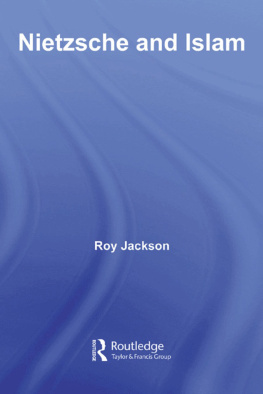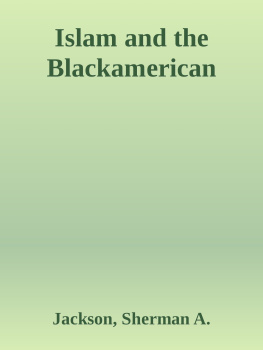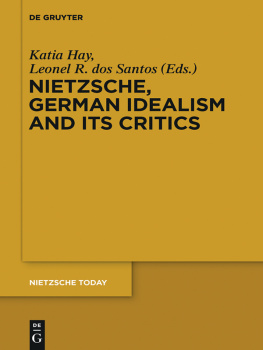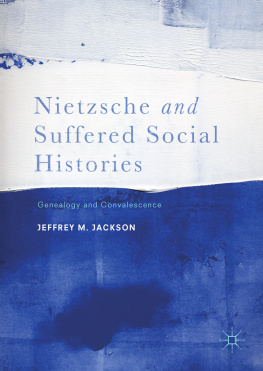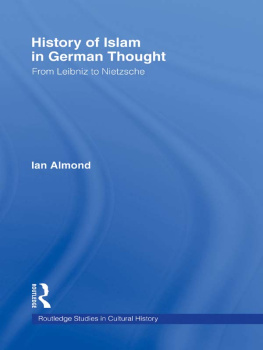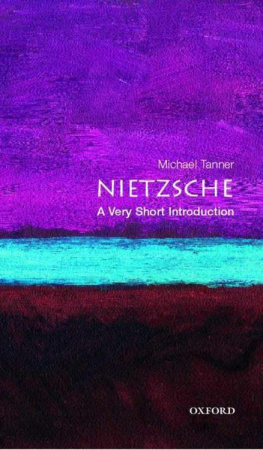Jackson Roy - Nietzsche and Islam
Here you can read online Jackson Roy - Nietzsche and Islam full text of the book (entire story) in english for free. Download pdf and epub, get meaning, cover and reviews about this ebook. City: London, year: 2011, publisher: Routledge, genre: Religion. Description of the work, (preface) as well as reviews are available. Best literature library LitArk.com created for fans of good reading and offers a wide selection of genres:
Romance novel
Science fiction
Adventure
Detective
Science
History
Home and family
Prose
Art
Politics
Computer
Non-fiction
Religion
Business
Children
Humor
Choose a favorite category and find really read worthwhile books. Enjoy immersion in the world of imagination, feel the emotions of the characters or learn something new for yourself, make an fascinating discovery.
- Book:Nietzsche and Islam
- Author:
- Publisher:Routledge
- Genre:
- Year:2011
- City:London
- Rating:4 / 5
- Favourites:Add to favourites
- Your mark:
- 80
- 1
- 2
- 3
- 4
- 5
Nietzsche and Islam: summary, description and annotation
We offer to read an annotation, description, summary or preface (depends on what the author of the book "Nietzsche and Islam" wrote himself). If you haven't found the necessary information about the book — write in the comments, we will try to find it.
Nietzsche and Islam — read online for free the complete book (whole text) full work
Below is the text of the book, divided by pages. System saving the place of the last page read, allows you to conveniently read the book "Nietzsche and Islam" online for free, without having to search again every time where you left off. Put a bookmark, and you can go to the page where you finished reading at any time.
Font size:
Interval:
Bookmark:

In the light of current events, particularly the post 9/11 debates with much focus on aspects of the clash of civilisation thesis, the issue of Islamic identity is a crucial one. Whilst Friedrich Nietzsche was addressing an audience of a different culture and age, his own originality, creativity, psychological, philological and historical insights allows for a fresh and enlightening understanding of Islam within the context of our modern era.
Roy Jackson's new book, Nietzsche and Islam, sets out to determine:
Why did Nietzsche feel inclined to be so generous towards the Islamic tradition yet so critical of Western Christianity?
How important was religion for Nietzsche's views on such matters as moral and political philosophy and how does this help us to understand the Islamic response to modernity?
How does Nietzsche's distinctive outlook and methodology help us to understand such key Islamic paradigms as the Qur'an, the Prophet, and the Rightly-Guided Caliphs?
Nietzsche and Islam provides an original and fresh insight into Nietzsche's views on religion and shows that his philosophy can make an important contribution to what is considered to be Islam's key paradigms. As such it will be of interest to a diverse readership and will provide useful material for researchers when thinking about religion, Islam and the future.
Roy Jackson is a lecturer, writer and freelance researcher in Philosophy and Religion. He is the author of a number of books on such topics as Plato, Nietzsche and the Philosophy of Religion. His book Fifty Key Figures in Islam was published by Routledge in June 2006.
Islamic studies
1 Iraqi Kurdistan
Political development and emergent democracy
Gareth R.V.Stansfield
2 Egypt in the Twenty First Century
Challenges for development
Edited by M.Riad El-Ghonemy
3 The Christian-Muslim Frontier
A zone of contact, conflict or cooperation
Mario Apostolov
4 The Islamic World-System
A study in polity-market interaction
Masudul Alam Choudhury
5 Regional Security in the Middle East
A critical perspective
Pinar Bilgin
6 Political Thought in Islam
A study in intellectual boundaries
Nelly Lahoud
7 Turkey's Kurds
A theoretical analysis of the PKK and Abdullah Ocalan
Ali Kemal zcan
8 Beyond the Arab Disease
New perspectives in politics and culture
Riad Nourallah
9 The Arab Diaspora
Voices of an anguished scream
Zahia Smail Salhi and Ian Richard Netton
10 Gender and Self in Islam
Etin Anwar
11 Nietzsche and Islam
Roy Jackson
Roy Jackson

LONDON AND NEW YORK
First published 2007
by Routledge
2 Park Square, Milton Park, Abingdon, Oxon, OX14 4RN
Simultaneously published in the USA and Canada
by Routledge
270 Madison Ave, New York, NY 10016
Routledge is an imprint of the Taylor & Francis Group, an informa business
This edition published in the Taylor & Francis e-Library, 2007.
To purchase your own copy of this or any of Taylor & Francis
or Routledge's collection of thousands of eBooks
please go to www.ebookstore.tandf.co.uk.
2007 Roy Jackson
All rights reserved. No part of this book may be reprinted or reproduced or utilised in any form or by any electronic, mechanical, or other means, now known or hereafter invented, including photocopying and recording, or in any information storage or retrieval system, without permission in writing from the publishers.
British Library Cataloguing in Publication Data
A catalogue record for this book is available from the British Library
Library of Congress Cataloging in Publication Data
A catalog record for this book has been requested
ISBN 0-203-02883-X Master e-book ISBN
ISBN10: 0-415-36855-3 (hbk)
ISBN10: 0-203-02883-X (Print Edition) (ebk)
ISBN13: 978-0-415-36855-1 (hbk)
ISBN13: 978-0-203-02883-4 (Print Edition) (ebk)
To my wife, Asmi and my two children, Raef and Nadiya
Background to the debate and work outlined
This book has two interconnected aims. First, it sets out to demonstrate that, contrary to many perceptions on the matter, Friedrich Nietzsche is not the standard bearer for atheism. In fact, it shall be argued, both the man and his philosophy are imbued with a deep religiosity. Second, I will argue that Nietzsche's philosophy has particular relevance for how Islamic identity is perceived in the modern world. Whilst Nietzsche rarely spoke specifically on Islam, his admiration for it as a religion is in sharp contrast to his criticism of Christianity. What I set out to determine is why Nietzsche felt inclined to be so generous towards Islam and, in the process of this determination, what this tells us about Nietzsche's own views on the importance of religion.
In the light of current events, particularly the post 9/11 debates with much focus on aspects of the clash of civilisation thesis, the issue of Islamic identity is a crucial one. Whilst Nietzsche was addressing an audience of a different culture and age, I aim to show that his philosophy can make an important contribution to this ongoing debate.
In achieving these aims, I want to focus on what is considered to be Islam's key paradigms: that of the Qur'an, Muhammad, Medina as the first Islamic state, and the four Rightly-Guided (Rashidun) caliphs. The focus is on these paradigms as they tend to dominate in terms of Islamic identity amongst Islamic revivalist scholars. In that respect, returning to Islam in what is perceived as its Golden Age is nothing original nor would be seen by Islamists as unorthodox. However, the originality lies in how one is to approach a study of these paradigms. It is in this respect that, I will argue, Nietzsche's own originality, creativity, psychological, philological and historical insights allows for a fresh and enlightening understanding of the Islamic paradigms within the context of our modern era.
The West as a concept of civilisation has seen its centre of gravity move from Western Europe to America to Eastern Europe. Israel represents the projection of this centre into the East to wipe out its specific character, its spiritual wealth, and humankind's hope for a new renaissance.
The above quote by the exiled leader of the Islamist movement in Tunisia, Rashid Ghannushi, is typical of a concern amongst many Muslims that there is a growingcivilisational conflict between Islam and the West. Rather than being presented with the theological view of Islam as a member of the same family as the Judaeo-Christian tradition, we have conflict and difference. Such a perception, of course, does not lie only with Islamist commentators, but many Western writers are just as guilty, if not more so, of portraying Islam as an Other.
Edward Said's well-known study, Orientalism, We can, in fact, learn much from Western scholars of Islam from the eighteenth and nineteenth centuries. As Albert Hourani noted:
There isrunning through the work of the great [Western] Islamic scholars one central strand of concernwhich attempted to articulate what Muslims believed to be the revelation given to mankind through the Prophet Muhammad: tradition, law, theology, mystical thought. A hundred years of study of these matters have produced a body of work which cannot be regarded as badly done.
Font size:
Interval:
Bookmark:
Similar books «Nietzsche and Islam»
Look at similar books to Nietzsche and Islam. We have selected literature similar in name and meaning in the hope of providing readers with more options to find new, interesting, not yet read works.
Discussion, reviews of the book Nietzsche and Islam and just readers' own opinions. Leave your comments, write what you think about the work, its meaning or the main characters. Specify what exactly you liked and what you didn't like, and why you think so.

